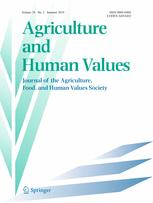Off to market: but which one? Understanding the participation of small-scale farmers in short food supply chains—a Hungarian case study
, Volume 35, Issue 2, pp 383–398
Authors: Zsófia Benedek – Imre Fertő – Adrienn Molnár
Abstract
The research described in this paper was designed to identify the factors that influence the importance small-scale farmers place on different marketing channels of short food supply chains. The focus concerns two entirely different types of market that are present in the bigger cities in Hungary: ‘conventional’ markets where there are no restrictions on locality but the farmer-market relationship is based on binding contracts, and newly-emergent farmers’ markets at which only local growers can sell ad hoc, using their own portable facilities. Results are based on a survey that was conducted in 2013 among 156 Hungarian market oriented farmer-vendors at different types of market and confirm that different markets are visited by different types of farmers. Farmers who favour conventional markets are typically less educated, operate on smaller scales and are more committed to their chosen markets via long-term contracts (which reduce the probability of their trying other outlets). The preference for farmers’ markets is stronger with farmers who are more open to cooperation, have specific investment plans for developing their farms and among those who are specifically looking to directly interact with their customers to avoid middlemen. The relevance of the findings is highlighted by the ongoing Short Food Supply Chain Thematic Sub-programme in the present European Union financing period; farmers’ profiles in any given marketing channel must be understood if short food supply chains are to be effectively promoted. Different types of small-scale farmers will benefit from different supporting frameworks, interventions, and initiatives.


